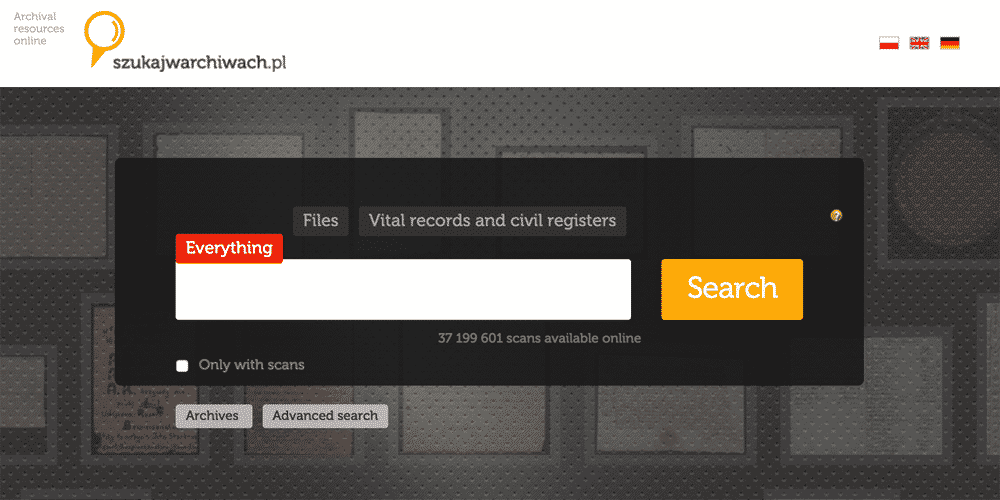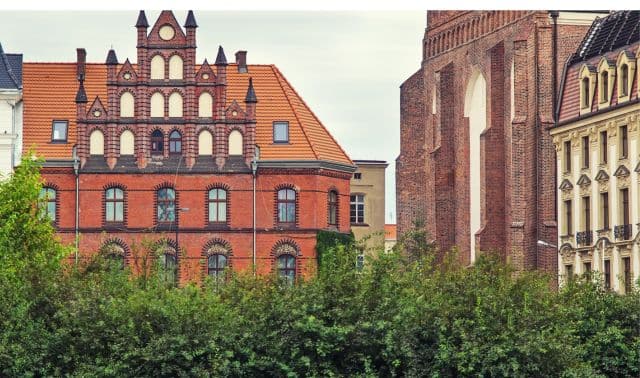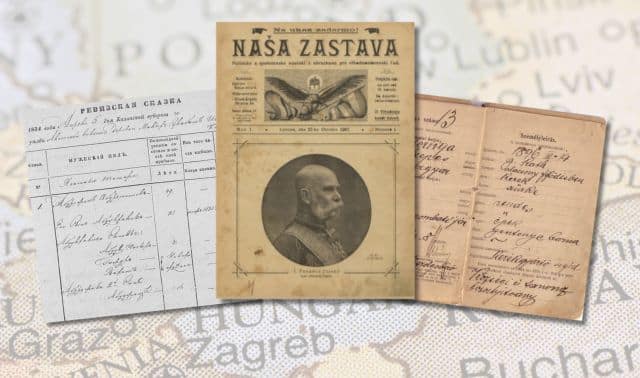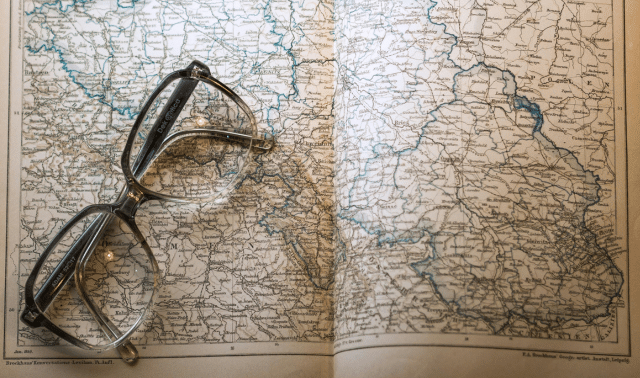Sign up for the Family Tree Newsletter! Plus, you’ll receive our 10 Essential Genealogy Research Forms PDF as a special thank you.
Get Your Free Genealogy Forms
"*" indicates required fields

Are you ready to trace your Polish immigrant ancestors back to their town of origin? If you’re among the more than 10 million Americans with Polish roots, you can now begin your research right from your easy chair. Polish genealogy traditionally has faced difficult challenges: Poland did not officially exist as a country for 123 years, and border changes and shifting political boundaries make it difficult to know where to search.
Whether your ancestors hailed from the Austrian, Prussian or Russian partitions, you can search and view online millions of index entries (and, in some instances, original record images) from archives all over Poland. These Polish genealogy websites (most of them free) can save you loads of legwork in locating ancestral hometowns and figuring out where to look for records.
While it is possible to research your Polish ancestors on the big genealogy websites, you can get to the “good stuff” faster by tapping into these 10 Polish genealogy websites:
1. Archiwum Glowne Akt Dawnych (AGAD)
Archiwum Glowne Akt Dawnych (AGAD; The Central Archives of Historical Records in Warsaw) provides access to online registry books and other digitized parish records from the Eastern areas of Poland, now in Ukraine. First, consult the site’s summary of inventories, organized by place name. When you get to a collection, look for “gallery with scans” (galeria ze skanami) to view digitized record images. AGAD has a YouTube video with instructions, with Polish subtitles.
2. Baza Systemu Indeksacji Archiwalnej (BaSIA)
The Baza Systemu Indeksacji Archiwalnej (BaSIA; Database of Archival Indexing System) of the Wielkopolska Genealogical Society contains more than 4 million entries from all over Wielkopolska (“Great Poland,” in modern west-central Poland). With a focus on the region in the 18th to 20th centuries, this easy-to-use database contains indexes that come from state and church archives, with some links to scanned images. Type a surname into the search box in the upper right corner, then select a pin from the resulting map to access digitized records. The website (which is available in English, French and German, in addition to Polish) also has a clickable map of archival units included in the database.
3. Geneteka
This 101 Best Genealogy Websites honoree is one of several databases of records and indexes prepared and maintained by Polskie Towarzystwo Genealogiczne (the Polish Genealogical Society). Geneteka contains over 31 million entries. Click the US/UK flag icon to toggle the site to English. Then select a region from the map (or the table at right) to view available parishes. (Alternatively, use the search box to type in the name of a parish, if you know it.) Then select Province and Parish using the dropdown menu, and enter a name in the Person field. You can also add a range of years or use the checkboxes to select other options.

The resulting table shows the number of records the name was found in each province for birth, marriage and death records. Click on one of the numbers for the detailed information, which will provide a list of the records. A yellow box labeled skan at the end of the row means you can click on the box to get to the digitized record. If a record doesn’t have the skan box, you can use the included information to check the FamilySearch catalog to check if the parish books have been microfilmed and digitized. Or you can write to the appropriate Polish archive and request the record.
4. HalGal
This site, belonging to researcher Matthew Bielawa, has databases you can search to find out whether the Central State Historical Archives of Ukraine or the FamilySearch Library (FSL) holds a particular Galician village’s or parish’s Greek or Roman Catholic church registers. (Galicia is an eastern portion of the region that is now divided between Poland and Ukraine.)
Other features include:
- guides to finding your ancestors’ village of origin
- tutorials for finding and reading vital records
- record examples
- regional history
- maps
5. Metryki
Geneteka’s sister database Metryki (“Metrics”) contains a number of vital record indexes. The main page contains a list of provinces and the number of microfilmed collections in each. Click a province to view more details. The locations and churches showing “0” will not have records, but those with a different numeric reference will. To access, click on the church name. You may also access records via the opracowane indeksy (developed indexes) tab in the top navigation bar; it looks like a step ladder.
6. PolandGenWeb
Click Help Pages (under Research Assistance) for research how-tos. Under Featured Projects, you’ll find records and a list of surnames other site users are researching. Among its other can’t-miss features are:

- a clickable map with links to resources for Polish provinces
- how-tos for getting started, finding towns, locating churches and more
- some record transcriptions
7. Polish Genealogical Society of America
Full access to this research society’s website requires a membership, although annual rates are reasonable and membership comes with the Rodziny quarterly journal. But free visitors can still access guides to genealogy research and other research resources.
Click Search Database to search the site’s free records, including:
- indexes including records of Haller’s Army (a WWI military unit)
- insurance records from Polish Roman Catholic Union of America
- death notice indexes from Polish newspapers in Chicago
Membership grants access to additional records collections, including vital records from Polish and Polish-American communities.
8. PolishRoots
This site allows you to register your Polish surnames and connect with others sharing those names. Check out these features, too:
- links to old gazetteers and directories covering Polish regions
- cross-index of Polish and German place names
- passenger ship lists
- the “Gen Dobry!” e-newsletter
9. Polish State Archives

The National Archives of Poland is creating this free online repository of digitized vital and civil records from the State Archives of Poland. The site (which is currently available in Polish, English and German) has more than 37 million scans available online. Directions with screenshots for navigating the site are available on FamilySearch. You can keyword-search all the site’s collections at once, or click the Archives button on the home page to see a quick pop-up list of archives. When you select an archive, you’re directed to a page with a description of that archive, contact information and other details.
10. Poznan Project
The volunteer-led Poznan Project was developed by Lukasz Bielecki. The site (available in Polish, English, French and German) has indexed more than 1.8 million marriage records from the 19th century for parishes in the former Prussian province of Posen, now Poznań, Poland.
Use the “Simple search” to enter a surname, or use the extended search if you already know what area or years to search. This site is an indexing project only, and does not have copies of the digitized records. But it does provide information on how to obtain them.
Bonus: JRI Poland and JewishGen
If searching for a Jewish ancestor, try the “Jewish Records Indexing—Poland” (JRI—Poland) database, containing 5.8 million records from more than 550 Polish towns. Start by reading the instructions, then use the search fields. The results are sorted by the location of the event and by the source of the data.
Another site, JewishGen, is helpful even if your ancestors weren’t Jewish. Check out the site’s maps, and use the JewishGen Gazetteer (formerly the ShtetlSeeker) for finding Polish towns. It uses a Soundex system for Yiddish or Slavic pronunciations.
Click Databases, then Poland for Poland-specific content. You’ll find:
- an index to millions of Jewish vital and other records from 500 Polish towns
- the JewishGen Poland Database index to vital records, voter lists, Holocaust sources and more
- a town index from a 1929 Polish business directory
Polish Research on the Big Genealogy Websites
You may prefer to keep your research on the major genealogy databases. Here’s where you can view Poland-specific collections on each site:
While these three websites offer access to some vital records and parish records (as well as other document types), record formats vary. Some are only images, while others have only indexes. You may need to do some extra work.
Searching for your Polish ancestor can certainly be a great adventure. But don’t let the tongue-twisting surnames, border changes and shifting political boundaries associated with the research process get you down. With millions of records being digitized by the big companies, societies and individuals, there has never been a better time to get started.
Versions of this article appeared in the July/August 2012 and September/October 2020 issues of Family Tree Magazine. Last updated May 2024.






